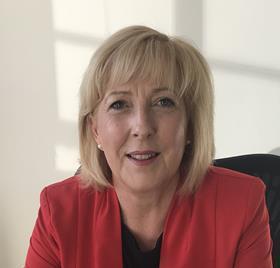By Fiona Reynolds, CEO (@fireynolds), PRI

The pandemic has underlined the importance of sustainable investing to global progress on ESG and stakeholder governance.
Following an incredibly challenging year for the world in 2020, many people were looking forward to 2021 and putting the vicissitudes of the COVID-19 pandemic behind them. But with many countries beginning 2021 with yet more lockdowns, hopes for a return to normalcy has been temporarily dashed. Despite the fact that life is still being viewed through a COVID-19 lens, the PRI predicts that this year will be a positive one for progress on a number of ESG issues.
Grave concerns around the pandemic remain. Breakthroughs on the vaccine front have been very welcome and we hope that developed economies will work together to ensure that poorer nations do not miss out on these potentially life saving measures. Already, we’ve seen Norway become one of the first countries in the world to explicitly commit to sharing COVID-19 vaccine doses with poorer countries at the same time as vaccinating its own citizens. Norway’s commitment follows a move from India earlier this month to send vaccines under “grant assistance” to a number of neighbouring countries.
For large numbers of the investment community, the pandemic has been a wake-up call for the need to invest is a more sustainable, holistic way. And those strategies are reaping dividends. In a recent report, Morningstar examined 745 sustainable funds compared to 4,900 traditional funds invested across large companies worldwide and found that sustainable funds performed better than their peers over various time horizons. Over five years the average annual return for a sustainable fund was 7.3 per cent, while its traditional counterpart returned 6.1 per cent. We expect to see more money moving into ESG funds in 2021 and for sustainable investing to be well on the way to becoming the new normal.
One of the most significant developments in 2021—and one which we feel could have long-term and far-reaching implications—is the installation of a new administration in the US. We were delighted to see that in the first day of the administration, the US re-joined the Paris Climate Agreement, a move which will send a positive message to other nations.
Despite setbacks on climate action over the last few years, we have seen some progress. The UK was the first major economy in the world to make a legally binding net zero commitment in June 2019. The European Union followed suit in March 2020. Since then, Japan and South Korea have joined what the UN estimates is now a total of over 110 countries that have set net zero target for mid-century. The US, the world’s biggest economy, is once again part of this carbon cutting assemblage.
At a policy level, we also expect the new administration to reverse the course that has been set by American regulators over the past few years. A 2019 executive order from President Trump directed the Department of Labor (DOL) to review regulation of private retirement plan fiduciaries (or “ERISA fiduciaries”) with an eye towards promoting the oil and gas sector. In response, the DOL proposed rules that, if finalised as proposed, will make it harder and costlier for ERISA fiduciaries to integrate ESG factors into their investment actions and participate in proxy voting aimed at advancing corporate responses to investors’ demands on ESG factors.
The integration of ESG considerations in investment policy and regulation in the US has fallen behind in the last four years compared to progress in Europe and Asia. US policymakers now have an opportunity to advance new policies that support sustainable investing and strengthen accountability, good governance and shareholder rights.
Respecting the natural world
One of the many weaknesses that COVID-19 has exposed is that we cannot continue treating nature with contempt.
This month, the UK teamed with France on measures to reverse biodiversity loss with addressing the climate crisis. President Macron committed to earmark 30% of France’s climate funding by 2030 for “nature-based solutions”. “We need to take actions now that will help us change the world and make it a better place by 2030,” he said. Boris Johnson said £3bn of the UK’s £11.6bn international climate finance commitment to 2025 will be spent on supporting nature and biodiversity.
The measures will include marine conservation, tackling the illegal timber trade and deforestation and conserving habitats such as mangroves that protect communities from climate impacts.
“Obviously it’s right to focus on climate change and cut CO2 emissions but we won’t achieve balance with our planet unless we protect nature as well. Climate change must now be seen as part of an overall agenda to protect the natural world,” he said.
Finally, the pandemic has highlighted social issues and the need to create an economic model that works for everyone, not just a privileged few. The economic chaos wrought by COVID-19 has hit low paid workers especially hard, many of whom are vital to keeping the economy going. Now is the time to create a stable global economy that protects the most vulnerable in order to ensure that no one is left behind.
Over the last several months, employers have had to re-think workplace models, ensuring revenues continue while also protecting workers. Human capital is the most important asset that companies have which is why employers need to address not just the immediate physical health and safety of employees, but also their mental health, ensuring employees have access to the right tools and policies for working from home as well as access to professional help for any emotional concerns. In the fullness of time, they will need to help employees return to work safely and undoubtedly have to deal with layoffs and morale issues. This is the time for company boards to step up and demonstrate real leadership by guiding and supporting management through these concerns.
This blog was first published for Board Agenda. This blog is written by PRI staff members and guest contributors. Our goal is to contribute to the broader debate around topical issues and to help showcase some of our research and other work that we undertake in support of our signatories. Please note that although you can expect to find some posts here that broadly accord with the PRI’s official views, the blog authors write in their individual capacity and there is no “house view”. Nor do the views and opinions expressed on this blog constitute financial or other professional advice. If you have any questions, please contact us at [email protected].












